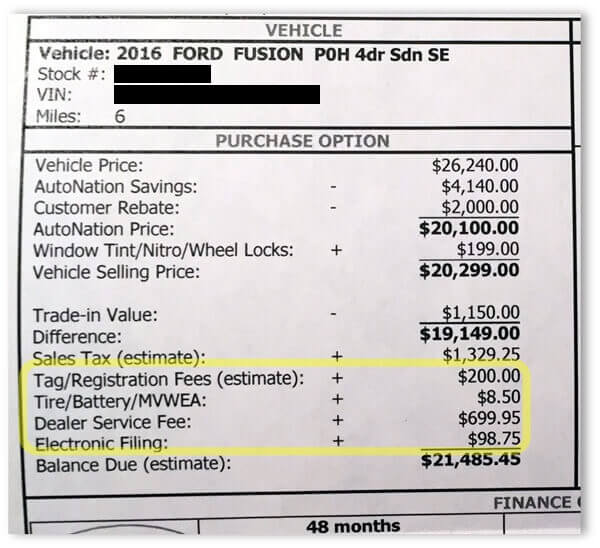CarBuyingTips.com Warns Car Dealers are Double Charging New Car Fees
Consumers are charged fees up to $1,000 or more on a new car
We have been reporting on car dealer strategies for consumers buying new cars for many years and mention some of the car dealer fees you are likely to see. But how much should these fees really cost, and how much profit is there for the car dealer? Today we will examine 4 common fees seen here in Florida, and explain them to you.
Here is a real life example for you. Last week I was helping by brother-in-law purchase a brand new 2016 Ford Fusion, and he had a quote to show me from one of our local Ford dealers and asked me to look it over and offer up my opinion. Here is the copy of the quote he received below, and I circled the dealer fees in yellow:

In the photo above there are 4 car dealer fees totaling a whopping $1,007.20. How many of you budget for this type of unforeseen surprise when you are shopping for a new car? Here are the 4 fees listed below:
Let's look deeper into each of these 4 fees outlined above, and we will give you definitions of what these fees really are, and how much you should really be paying for the fees. Just think about it for a moment, they are doing this with every single car sold from their dealerships.
1) Tag/Registration Fees
How much the fee was: $200. How much it should have been: $100 or less. These fees are necessary to register your new car with the state DMV. This area of calculating DMV fees causes a lot of confusion, because there can be a number of components that make up this fee from your state including the weight of the vehicle, and most car shoppers are uninformed on how much their state DMV really charges so they often fall victim to salespeople who inflate the fees. But you are smart and you did your homework and came here for intelligence on how to beat these scams.
Here in Florida the initial registration fee of a new car would be $200 if you don't have a license plate to transfer from your old car to the new car. If you do have a license plate from trading in your used car at the dealer, then your registration fees may be significantly less.
We got our pricing information directly from the Florida Highway Safety and Motor Vehicles. The FHSMV is essentially our Florida DMV. Search for your state's official DMV site and compare prices so you know how much the car dealer should charge you before you buy a car.
Beware of DMV wanna be web sites
Warning: Beware of all those opportunistic "DMV" web sites that show up in the search results, with fancy DMV acronyms with your state in their name. They are just trying to game Google's search results and insert themselves as a middleman between you and the real DMV.
Also your state's real DMV web site will end in a .GOV web site address, indicating it is the official state government site. The real DMV web site name will not end in .ORG and not in .COM or any other extensions. Don't be fooled, go right to the real official government web site.
2) Tire/Battery/MVWEA (Motor Vehicle Warranty Enforcement Act)
How much the fee was: $8.50. How much it should have been: $7.50. This set of 3 fees is levied by the Florida Department of Revenue, not the DMV. With this tiny fee, they lump 3 of them together in some cryptic mysterious fee that most car buyers don't know what it is, but they blindly pay it anyway.
Most states impose this useless fee for impact on the environment of tires, and new car batteries, and here in Florida we also have this long winded fee name called the MVWEA - Motor Vehicle Warranty Enforcement Act, also known as the Lemon Law. So every car that is purchased, $2 dollars goes into this fund for dud cars that are returned under the Lemon Law. Every new tire sold in Florida is levied a fee of $1.00 and every new car battery sold is levied a fee of $1.50.
Altogether these 3 fees should total $7.50, not $8.50 like the dealer is charging my brother-in-law above on the screen shot of his quote. Even though it is only a dollar, it adds up over their thousands of sales. Why should you pay even 1 penny in extra fees?
3) Dealer Service Fee, aka Dealer Prep Fee, aka Dealer Pre-Delivery Service
Don't get me started! I've been banging the tables about this junk fee for 17 years. Many car dealers will have this fee on their paperwork, sometimes pre-printed, to persuade you away from trying to haggle it off. But you should try to anyway and get them to subtract it on another line. For all the other car buyers who pay this fee, let those folks make up for the dealer's loss in not charging you the dreaded dealer prep fee.
We cover dealer prep and other fees here on CarbuyingTips.com in our chapter titled Glossary of New Car Dealer Fees but basically it's a huge amount of money charged for essentially nothing. Their lowest paid employees remove the plastic off the car and get it ready for sale in an hour or 2 after it rolls off the truck, certainly not worth paying up to $300 per hour for 2 hours of labor.
4) Electronic Filing Fees
How much the filing fee was: $98.75. How much the fee should have been: $20 max. This one is the hardest of the fees to understand. In previous years, dealers had their lowest paid $10 per hour file clerks process the registration of your new car purchase, and often charged you documentation fees of $250 or more, which was a real slap in the face. It supposedly cost the dealer from $60-$100 to process a vehicle registration with the state, but I still don't believe it was that high.
But now 3rd party CRM companies like DealerTrack whom we see at NADA every year have sprouted up who handle the electronic In-State Registration and Titling for the car dealer. This is fast, immediate and automated. All the information on the car is entered in at the time of sale.
The 3rd party company takes this info from the car dealer computer and automatically registers the new car for you, with little or no intervention from file clerks. They supposedly charge the car dealer anywhere from $10 to $40 per electronic vehicle registration.
So counterintuitive to the bogus $98.75 the dealer charged in this case. I present my argument that they should not be charging you at all for electronic filing, since it has reduced manpower needs and its very presence is saving the car dealer money. So it's not even really a fee in my opinion, it's an income for the dealer.
Car dealers break the law by not disclosing these fees have profit
If a new car dealership is listing dealer fees on the paperwork, chances are there are statutes in your state that govern how they have to present this pricing data to you. Here in Florida, they must tell you there is profit built into the fee. I told my brother-in-law to mention this to the car dealer, hold them accountable, and to confront them with all this data from the state on the real cost of these fees, and to get them to come down on the price of the fees. I am happy to report the dealer sliced all the fees in half and met him half way, only charging him $500 instead of $1,000.
I bet over 90% of all new car buyers just blindly follow the Pied Piper here and pay all these padded fees. The states need to clamp down and actually enforce their own laws governing bad behavior by car dealerships.
What the law really says about car dealer fees and new car prices
Your state might have similar statutes so you need to look them up and compare to what we have here in our Florida Statutes, as found on our state legislature's web site. The statute is 501.976, which is called "Actionable, unfair, or deceptive acts or practices."
The statute states that here in Florida "It is an unfair or deceptive act or practice, actionable under the Florida Deceptive and Unfair Trade Practices Act, for a dealer to…" and then they ramble off a list of about 20 items that car dealers can't do. The 2 subsections I want to focus on here are (16) and number (18).
F.S. 501.976 (16) states that car dealers can't "advertise the price of a vehicle unless the vehicle is identified by year, make, model, and a commonly accepted trade, brand, or style name. The advertised price must include all fees or charges that the customer must pay, including freight or destination charge, dealer preparation charge, and charges for undercoating or rustproofing. State and local taxes, tags, registration fees, and title fees, unless otherwise required by local law or standard, need not be disclosed in the advertisement. When two or more dealers advertise jointly, with or without participation of the franchisor, the advertised price need not include fees and charges that are variable among the individual dealers cooperating in the advertisement, but the nature of all charges that are not included in the advertised price must be disclosed in the advertisement."
F.S. 501.976 (18) is the other statute I see most car dealers violate the law on. The exact verbiage states car dealers cannot "Charge a customer for any pre-delivery service without having printed on all documents that include a line item for pre-delivery service the following disclosure: “This charge represents costs and profit to the dealer for items such as inspecting, cleaning, and adjusting vehicles, and preparing documents related to the sale."
The statute listed above means that whenever a car dealer charges you that over inflated and bloated joke of a dealer prep pre-delivery service fee, they are required by law to tell you on the paperwork that it includes profit to the dealer. In other words, the dealer prep fee is mostly profit to the dealer, but they don't disclose that to you, and that is a violation of state laws.
Why doesn't the state prosecute car dealers who violate this law?
That is a good question, most likely because states have limited resources to prosecute cases, and they have to choose their battles. Typically you see no action from your state when you complain of a business ripping you off until numerous victims come forward with complaints of major losses.
Our advice to save you hundreds in car dealer fees
The first weapon in your arsenal is knowledge. Once you know more than the salesperson, they are dead in the water. Bring in printouts of these fees right from your state web sites, much like the links I directed you to above. Salespeople can't argue with the true pricing on a government agency web site. Don't be afraid to ask them to remove or reduce the fees you think are being padded.
You will be surprised how often they are willing to reduce the fees back down from the stratosphere and down to their legitimate pricing. But one thing is for sure, the answer is no unless you ask for it.
Now it is your turn to speak out, let us know what fees you saw and how successful you were at getting your car salesperson to drop the fees. Happy car shopping!

About The Author: Jeff Ostroff
A lifelong consumer advocate with over 20 years of unparalleled expertise, Jeff is the Founder, CEO and Editor-In-Chief of CarBuyingTips.com. As chief consumer advocate, he oversees a team of experts who cover all aspects of buying and selling new and used cars including leasing and financing.
For decades, Jeff has been the recognized authority on vehicle purchasing, sought out often by the media for his decades of experience and commentary, for live call-in business radio talk shows and is cited often by the press for his expertise in savvy car shopping methods and preventing consumer scams and online fraud. Jeff has been quoted in: CNN, MSNBC, Forbes, New York Times, Consumer Reports, Wall Street Journal and many more.
Jeff also has extensive experience and expertise in new car brokering and selling used cars for clients on eBay and Craigslist. Connect with Jeff via Email or on Twitter.







